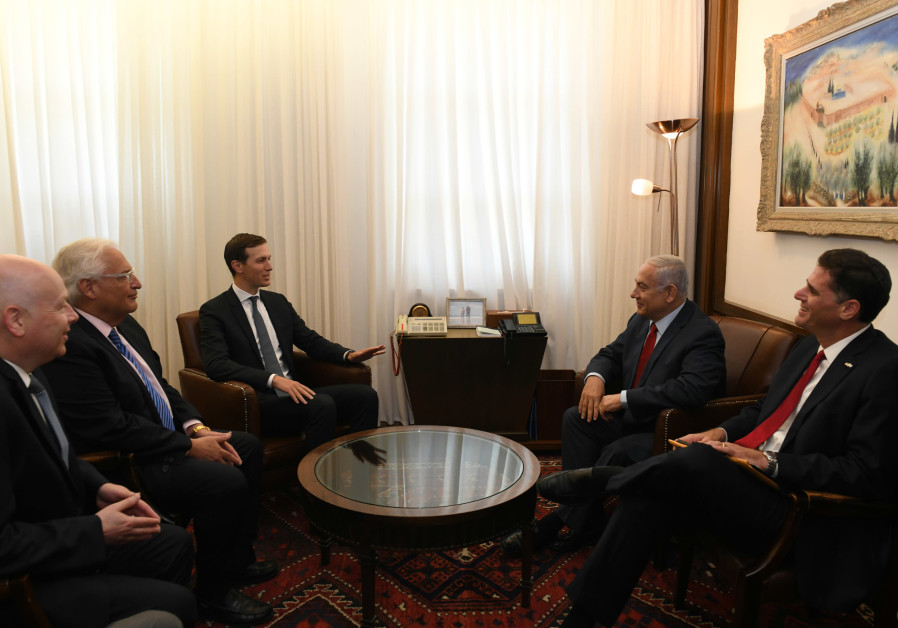Jared Kushner meets with Netanyahu in Israel as U.S. doubles down on peace plan

Special envoy Jason Greenblatt, US Ambassador David Freidman, special envoy Jared Kushner, Prime Minister Benjamin Netanyahu and Ambassador the US Ron Dermer meet in Jerusalem, July 31, 2019. (photo credit: KOBI GIDON / GPO)
Prime Minister Benjamin Netanyahu met Wednesday evening with senior White House adviser Jared Kushner, who is on a tour of five Middle East countries before Washington decides on the next step following June’s economic workshop in Bahrain.
A senior White House official said before the meeting that Kushner and the Middle East negotiations team will report back to US President Donald Trump, Vice President Mike Pence, Secretary of State Mike Pompeo and the national security team to “discuss the many potential next steps to expand upon the success of the Bahrain workshop.”
One question that needs to be resolved is whether the rollout of the 60-page political chapter of the peace framework the administration has been working on for some two years will take place before or after the September 17 election here.
Yediot Aharonot reported on Wednesday that Trump was planning a summit with Arab leaders at Camp David before the election, where he would present the broad strokes of his Middle East peace plan.
The newspaper, which characterized this as an “election gift” to Netanyahu, asserted that the prime minister and Ambassador to the US Ron Dermer were involved in the planning, even though Netanyahu would not be invited, so as to make participation for the Arab leaders easier.
Dermer, along with US Ambassador David Friedman, took part in the Kushner-Netanyahu meeting, as did Middle East negotiator Jason Greenblatt and US Special Representative for Iran Brian Hook.
A senior White House official said that “no summit has currently been planned.”
Kushner and his team arrived in Jerusalem from Jordan, where he held talks with King Abdullah II. Before meeting the US team, Abdullah met in Abu Dhabi on Saturday with UAE Crown Prince Mohammed bin Zayed, and on Monday with Egyptian President Abdel Fattah al-Sisi in Cairo, in an apparent effort to formulate a united position on the Trump plan.
The US team is expected to leave on Thursday for Egypt, Morocco and Saudi Arabia to discuss the next moves.
Following the Kushner-Abdullah meeting in Amman, Jordan’s official news service reported that Abdullah reaffirmed “the need to achieve just, comprehensive and lasting peace on the basis of the two-state solution, which guarantees the establishment of an independent Palestinian state on the June 4, 1967 lines, with east Jerusalem as its capital, living side by side with Israel in peace and security, in accordance with the Arab Peace Initiative, international law and relevant UN resolutions.”
Kushner, Greenblatt and Friedman have declined in numerous interviews and speeches to say that the US plan calls for a two-state solution.
Friedman said in a CNN interview on Tuesday that the administration has not used that language not because it is driving toward a one-state solution, but, rather, because “it is a disservice for us to use that phrase until we can have a complete exposition of all the rights, all the limitations that would go into Palestinian autonomy.”
“We believe in Palestinian autonomy,” the ambassador continued. “We believe in Palestinian civilian self-governance. We believe that autonomy should be extended up until the point where it interferes with Israeli security. And it’s a very complicated needle to thread.”
The “last thing” the world needs right now, Friedman said, “is a failed Palestinian state in between Jordan and Israel. And right now, the Palestinian government is so weak, they have no answer to Hamas. They leave that to Israel to take care of. They have no answer to Islamic Jihad. They leave that to Israel to take care of. And what can’t happen here? The one thing that can’t happen is the Palestinians obtain independence and, in short order, this becomes a failed state controlled by Hamas, Hezbollah, ISIS or al-Qaeda.”
Tzvi Joffre contributed to this report.
Join Jerusalem Post Premium Plus now for just $5 and upgrade your experience with an ads-free website and exclusive content. Click here>>






Comments are closed.